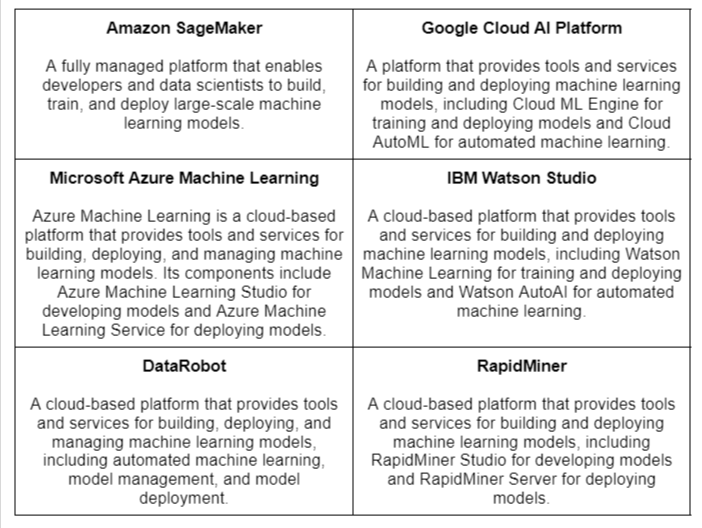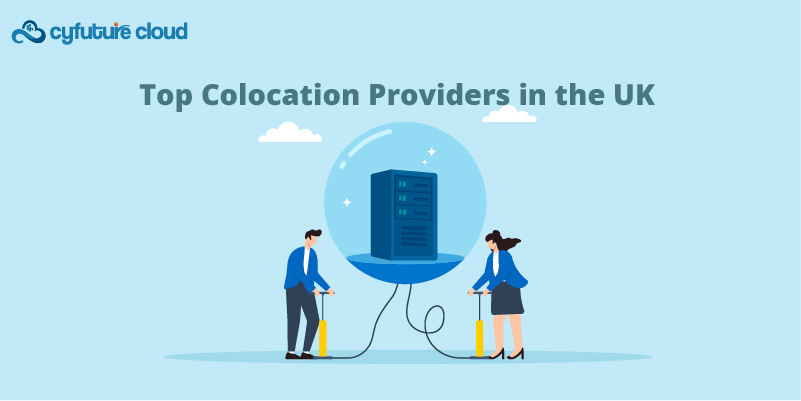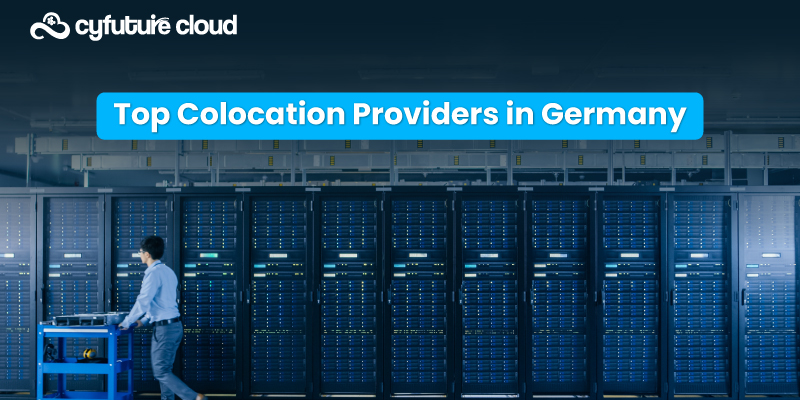Table of Contents
AI and ML-powered cloud use artificial intelligence and machine learning technologies in cloud computing environments. These technologies allow organizations to analyze and process large amounts of data, gaining insights and making previously impossible predictions.
|
Did You Know? Another report from ResearchAndMarkets predicts that the global machine learning in the cloud market will grow from $3.4 billion in 2018 to $22.8 billion by 2023, at a CAGR of 44.9% during the forecast period. |
This growth is attributed to the increasing demand for cloud-based machine learning services and the need for cost-effective and scalable solutions.
Many major technology companies, such as Amazon, Google, Microsoft, and IBM, offer AI and ML-powered cloud services, which allow customers to easily build, deploy, and scale their own AI and ML models.
These services include cloud-based platforms, tools, and APIs that make it easy for developers to train, deploy, and manage machine learning models and access pre-trained models and other resources.
The use of AI and ML in the cloud is becoming increasingly popular as it allows businesses and organizations to gain new insights, automate processes, and make more accurate predictions, resulting in cost savings and increased efficiency.
Read this blog to get more insights into this!
What is AI and ML-powered Cloud?
AI and ML-powered cloud refer to integrating artificial intelligence (AI) and machine learning (ML) technologies into cloud computing environments. This integration allows organizations to leverage the power of cloud computing, including scalability, accessibility and cost-effectiveness, to run and manage AI and ML models. With AI and ML-powered cloud, businesses can access a wide variety of tools and resources to process, analyze, and gain insights from large amounts of data, which can improve decision-making, automate processes, and create new products and services.
Importance of AI and ML-powered Cloud
The use of AI and ML-powered cloud is becoming increasingly important as it allows organizations to gain a competitive advantage by leveraging the power of AI and ML to improve decision-making, automate processes, and create new products and services. According to a report by MarketsandMarkets, the global machine learning in the cloud market is expected to grow from $3.4 billion in 2018 to $22.8 billion by 2023, at a CAGR of 44.9%. The increasing adoption of cloud-based AI and ML services and the need for real-time data processing and cost-effective and scalable solutions drive this growth. By using AI and ML-powered cloud, organizations can gain insights from large amounts of data, improve operational efficiency and make better decisions, ultimately leading to increased revenue and growth.
Types of AI and ML-Powered Cloud Services
There are several types of AI and ML-powered cloud services, including:
– Machine Learning Platforms: These services provide tools and infrastructure for building, deploying, and managing machine learning models. Examples include Amazon SageMaker, Google Cloud ML Engine, and Microsoft Azure Machine Learning.
– Natural Language Processing (NLP) Services: These services provide pre-trained models and APIs for language translation, sentiment analysis, and text generation tasks. Examples include Amazon Translate, Google Cloud Natural Language, and Microsoft Azure Cognitive Services.
– Computer Vision Services: These services provide pre-trained models and APIs for object detection, image recognition, and facial recognition. Examples include Amazon Rekognition, Google Cloud Vision, and Microsoft Azure Cognitive Services.
– Robotics: These services provide tools and infrastructure for building, deploying, and managing robotic systems. Examples include Amazon RoboMaker and Google Cloud Robotics.
– Speech Recognition and Synthesis: These services provide pre-trained models and APIs for speech-to-text, text-to-speech, and speaker recognition tasks. Examples include Amazon Transcribe, Google Cloud Speech-to-Text and Text-to-Speech, and Microsoft Azure Cognitive Services.
– Predictive Analytics: These services provide tools and infrastructure for building, deploying, and managing predictive models. Examples include Amazon Forecast and Google Cloud AutoML.
– Deep Learning: These services provide pre-trained models and APIs for tasks such as image classification, object detection, and natural language processing. Examples include Amazon Deep Learning AMIs, Google Cloud Deep Learning VMs, and Microsoft Azure Cognitive Services.
Cloud-based AI and ML Platforms
The cloud-based AI and ML platforms typically provide various tools and services for data preparation, model development, training, evaluation, deployment, and integration with other cloud services such as storage and data processing. They also provide scalability and flexibility, allowing users to expand or reduce computing resources as needed easily. There are several cloud-based AI and ML platforms available, including:

Cloud-based AI and ML Infrastructure
Cloud-based AI and ML infrastructure refer to the underlying hardware and software resources provided by cloud providers to support the development, training, and deployment of AI and ML models. These resources may include:
– Computing power: Cloud providers offer a range of compute options, from virtual machines to GPU- and TPU-enabled instances, to support the high computational requirements of AI and ML workloads.
– Storage: Cloud providers offer various storage options, including object storage and relational databases, to support the storage of large amounts of data required for training and deploying AI and ML models.
– Networking: Cloud providers offer a range of networking options, such as load balancers and virtual private networks, to support the secure and efficient data transfer between AI and ML workloads.
– Containers and orchestration: Cloud providers offer a range of containerization options, such as Docker and Kubernetes, to support the deployment of AI and ML models in a scalable and portable manner.
– Databases: Cloud providers offer various database options, both SQL and NoSQL, to support the storage of large amounts of data required for training and deploying AI and ML models.
– Cloud-based data processing: Cloud providers offer a range of data processing tools and services, such as Cloud Dataflow, AWS Glue and Azure Data Factory, to support the pre-processing, cleaning and transforming data for training and deploying AI and ML models.
– Cloud-based data warehousing: Cloud providers offer a range of data warehousing options, such as Redshift, Bigquery and Azure Synapse Analytics, to support the storage and querying of large amounts of data for training and deploying AI and ML models.
These cloud-based AI and ML infrastructures typically provide scalability, flexibility, and cost-effectiveness to support the development, training and deployment of AI and ML models and allow for easy integration with other cloud services such as storage and data processing.
Cloud-based AI and ML Software and Tools
There are several cloud-based AI and ML software and tools available, including:
– Cloud-based machine learning frameworks, such as TensorFlow, PyTorch, and Caffe, provide pre-built libraries and tools for building and training machine learning models.
– Cloud-based deep learning platforms, such as Amazon Deep Learning AMIs, Google Cloud Deep Learning VMs, and Microsoft Azure Cognitive Services, provide pre-built libraries and tools for building and training deep learning models.
– Cloud-based data visualization tools: These tools, such as Amazon QuickSight, Google Data Studio, and Microsoft Power BI, provide visualizations and dashboards for exploring and understanding data.
– Cloud-based data science notebooks: These notebooks, such as Amazon SageMaker Notebook, Google Colab, and Microsoft Azure Notebooks, provide an interactive development environment for data exploration, experimentation, and prototyping.
– Cloud-based model management and deployment: These tools, such as Amazon SageMaker, Google Cloud AI Platform, and Microsoft Azure Machine Learning, provide a way to manage, deploy, and monitor machine learning models in production.
– Cloud-based AutoML: These platforms, such as Google Cloud AutoML, DataRobot, and Alteryx, provide automated machine learning capabilities, allowing data scientists and analysts to train models without having to write code.
– Cloud-based NLP and Computer Vision services: These services, such as Amazon Translate, Google Cloud Natural Language and Microsoft Azure Cognitive Services, provide pre-trained models and APIs for tasks such as language translation, sentiment analysis, text generation, object detection, image recognition, and facial recognition.
– Cloud-based Speech Recognition and Synthesis services: These services, such as Amazon Transcribe, Google Cloud Speech-to-Text and Text-to-Speech and Microsoft Azure Cognitive Services, provide pre-trained models and APIs for tasks such as speech-to-text, text-to-speech, and speaker recognition.
These cloud-based AI and ML software and tools typically provide a user-friendly interface and pre-built functionality, allowing users to focus on developing and deploying models rather than building and maintaining infrastructure. They also provide scalability and flexibility, allowing users to expand or reduce computing resources as needed easily.
Cloud Based Artificial Intelligence
Cloud-based artificial intelligence (AI) leverages remote computing infrastructure and services to facilitate the development, deployment, and execution of AI algorithms and applications. This approach enables organizations to access scalable computational resources, storage, and specialized AI tools hosted on cloud platforms such as Amazon Web Services (AWS), Google Cloud Platform (GCP), or Microsoft Azure. By utilizing cloud-based AI, businesses can streamline AI model training, optimize data processing workflows, and deploy intelligent solutions without significant on-premises hardware investments. This paradigm empowers users to harness the power of AI, allowing for flexibility, scalability, and cost-effectiveness in utilizing cutting-edge machine learning and AI capabilities for diverse applications and industries.
What is cloud machine learning
Cloud machine learning refers to the practice of utilizing cloud-based infrastructure and services to develop, train, and deploy machine learning models. This approach leverages the computational power, storage, and scalability provided by cloud computing environments from service providers like Amazon Web Services (AWS), Google Cloud Platform (GCP), Microsoft Azure, and others.
Cloud machine learning involves:
-
Scalable Infrastructure: Cloud platforms offer scalable resources such as computing power, storage, and specialized hardware (like GPUs and TPUs) to handle large-scale machine learning tasks.
-
Managed Services: Providers offer managed machine learning services, which include tools and frameworks for building, training, and deploying models, reducing the complexity of infrastructure management.
-
Accessibility and Collaboration: Cloud-based solutions allow remote access, collaboration, and sharing of resources, facilitating teamwork and enabling broader access to machine learning capabilities.
-
Cost-Efficiency: Pay-as-you-go models enable cost-effective usage, allowing organizations to scale resources as needed and pay only for what they use, reducing upfront infrastructure costs.
-
Integration with Other Services: Cloud machine learning services often integrate with various data storage solutions, databases, and analytics tools, enabling seamless data processing, analysis, and utilization for machine learning tasks.
Overall, cloud machine learning empowers businesses and developers to harness sophisticated machine learning technologies without significant upfront investments in hardware, thereby fostering innovation, scalability, and accessibility in building and deploying intelligent applications.
Use Cases of AI and ML-Powered Cloud
A few use cases of AI and ML-powered cloud are enlisted below:
Predictive Maintenance
- Predictive maintenance uses AI and machine learning algorithms to analyze data from sensors on equipment to predict when maintenance will be needed.
- This can reduce downtime, increase efficiency, and lower maintenance costs.
- According to a study by MarketsandMarkets, the global predictive maintenance market is expected to grow from $3.4 billion in 2020 to $10.9 billion by 2025 at a CAGR of 25.4%.
Image and Voice Recognition
- AI and machine learning can improve image and voice recognition in various applications, such as security systems, self-driving cars, and virtual assistants.
- According to a report by MarketsandMarkets, the global market for image recognition is expected to grow from $25.65 billion in 2020 to $39.84 billion by 2025, at a CAGR of 8.9%.
- The global market for voice recognition is expected to grow from $10.1 billion in 2020 to $19.48 billion by 2025 at a CAGR of 14.6%.
Natural Language Processing
- AI and machine learning can be used to improve natural language processing for applications such as chatbots, voice assistants, and language translation.
- According to a report by ResearchAndMarkets, the global natural language processing market is expected to grow from $8.63 billion in 2020 to $30.8 billion by 2025, at a CAGR of 29.1%.
Fraud Detection
- AI and machine learning can detect fraudulent activity in various industries, such as finance, healthcare, and e-commerce.
- According to a report by MarketsandMarkets, the global fraud detection and prevention market is expected to grow from $24.3 billion in 2020 to $54.2 billion by 2025, at a CAGR of 18.2%.
Challenges and Considerations
AI and ML-powered cloud services offer many benefits, but they also come with challenges and considerations. Businesses must carefully evaluate these challenges and considerations before implementing AI and ML-powered cloud services to ensure a successful outcome. A few of the top ones are explained below.
Data Privacy and Security
One of the biggest challenges with AI and ML-powered cloud is ensuring the privacy and security of sensitive data. According to a report by PwC, 84% of organizations say they have concerns about data privacy and security in their AI and ML initiatives. Businesses should ensure that they have proper data governance and security protocols to protect sensitive information.
Integration with Existing Systems
Another challenge is integrating AI and ML models with existing systems and processes. According to a report by McKinsey, 75% of organizations struggle with integrating AI models with existing systems. Businesses should carefully plan and test the integration of AI and ML models with existing systems to ensure they function as intended.
Scalability and Cost
The scalability and cost of AI and ML-powered cloud is a business considerations. AI and ML workloads require significant computing power and storage, which can be costly if not managed properly. Furthermore, businesses need to ensure that the AI and ML models are scalable to handle the volume and velocity of data. According to a report by Gartner, 85% of AI projects will deliver erroneous outcomes due to a lack of scalability and computing power. Businesses should work with their cloud provider to ensure they have the necessary resources to handle their AI and ML workloads and optimize costs.
Future Developments & Trends
The field of AI and ML is constantly evolving, and we can expect to see new developments and advancements in these technologies. This includes natural language processing, computer vision, and deep learning advancements. These advancements will enable businesses to build more accurate and sophisticated models, leading to more accurate predictions and better decision-making. The adoption of cloud-based AI and ML services is expected to grow as more organizations realize the benefits of these services.
In conclusion, AI and ML-powered cloud services offer businesses a way to gain insights and make previously impossible predictions. These services are becoming increasingly popular as they allow businesses to improve decision-making, automate processes, and create new products and services. With advancements in AI and ML technology and the increasing adoption of cloud-based services, we expect to see more and more businesses leveraging the power of AI and ML in the cloud in the future.
Recent Post
Send this to a friend

 Server
Colocation
Server
Colocation CDN
Network
CDN
Network Linux
Cloud Hosting
Linux
Cloud Hosting Kubernetes
Kubernetes Pricing
Calculator
Pricing
Calculator
 Power
Power
 Utilities
Utilities VMware
Private Cloud
VMware
Private Cloud VMware
on AWS
VMware
on AWS VMware
on Azure
VMware
on Azure Service
Level Agreement
Service
Level Agreement 



















